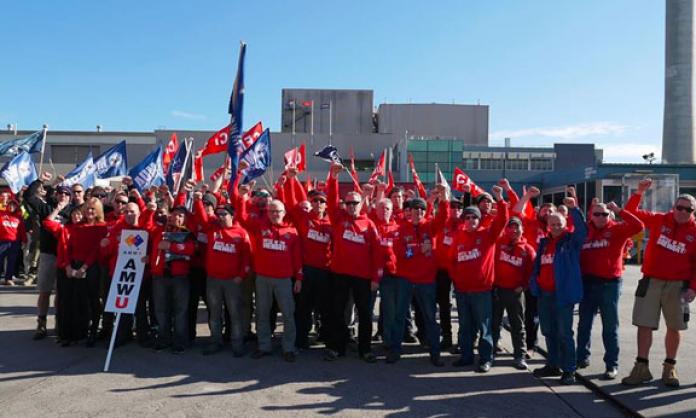“This whole thing is about getting rid of the union out of this joint”, Sam, an AMWU delegate and maintenance fitter who has worked at Carlton United Breweries for more than 30 years, told Red Flag.
Those unions – the AMWU, ETU and CFMEU – have for decades been the only institutions standing up for workers at the brewery.
But several weeks ago, Sam and 54 other unionised maintenance workers at CUB Abbotsford were sacked and offered their jobs back on individual contracts. It would mean a 65 percent pay cut and temporary employment. They have been protesting for their jobs back on unionised contracts ever since.
“It’s all to do with profits”, Sam continued. “They want to screw us. And they want to pay us nothing for what we do.”
That pursuit of profit is built into the very foundations of CUB.
Its predecessor, the Society of Melbourne Brewers, was founded in 1903 when Carlton, Fosters, Victoria, Shamrock, Castlemaine and McCracken breweries formed a cartel to fix prices and force competitors out of the market. The Abbotsford plant was acquired from one of these competitors in 1924.CUB workers, organised through their unions, have pushed back against that drive to accrue profits. And the history of that struggle is memorialised at the brewery in many ways.
The most notable are the memories of an older generation of workers. They recall the strength of shop floor organisation when they entered the workforce in the late 1970s. “The bosses wouldn’t try anything like this back then”, explained Alan, who has worked at CUB since 1976. “They knew they would lose.”
Those stories of class pride have been passed down through the generations.
Sam tells me about a plaque that sits above the management office, which pays tribute to the improvement of wages and conditions for workers by the end of the 1920s: “Some of these conditions we’re talking about – like income protection – go all the way back to World War One”.
Yet the plaque distorts history, attributing the improvements to the good will of the company. In reality, it was the class struggle of CUB workers that earned them those victories.
During the war, CUB workers were among the most militant in Australia. They campaigned against the scapegoating of workers who had been sacked simply for being of German descent.
In 1916 they helped defeat two attempts by the Hughes Labor government to introduce conscription. After the war, they led mass strikes against the worst aspects of the economic crisis gripping Australia. The liquor trades union was among the first to elect women delegates in the hospitality industry. And in the 1920s, shop stewards collected donations for the besieged workers’ state in Russia.
“It was a big drinking place back in those days too”, explains Colin, 52, who completed his apprenticeship at the brewery and has worked here for 34 years. “You were allowed two pots per break. But we used to have blokes here that would go and have their two pots at the bar, then piss off over to the pub and have another skinful. People would finish work absolutely legless.”
In the mid-1990s, the site was made a dry zone and the on-site bars shut down. The combined CUB premises once employed tens of thousands of workers in a network that supplied the vast bulk of Australian beer. But fierce competition from overseas competitors – combined with the semi-automation of the production process – has made many workers and equipment redundant. Today, only 300 workers remain at CUB’s last brewery in Abbotsford.
From liquor stores to pubs to social media, most in the community oppose the actions of CUB. At my local, a bartender tells me: “They are always the worst to deal with. It’s no surprise they treat their own workers like piss”.
The older generation of workers explain the damage that has been done to their bodies working in the metal trades over the years. Their joints and ligaments have been worn down under the strain of intensive labour; their faces are weathered from welding sparks and hot steam.
When they hear about the Polar Fresh workers voting almost unanimously for indefinite strike action, eyes light up: “That’s exactly what our unions need to be doing all across this bloody country. We could stop all these grubs right in their tracks. We’ve done it before and can do it again”.
They understand something that they have taught the younger generation at the brewery: everything worth living for has been won through struggle. A victory for CUB would mean a defeat for unionised workers everywhere – not just inside the brewery, but all those who face a similar offensive on their rights at work elsewhere.
“They’ll say to themselves, ‘CUB has done it so we’ll do it too’”, Sam says.











